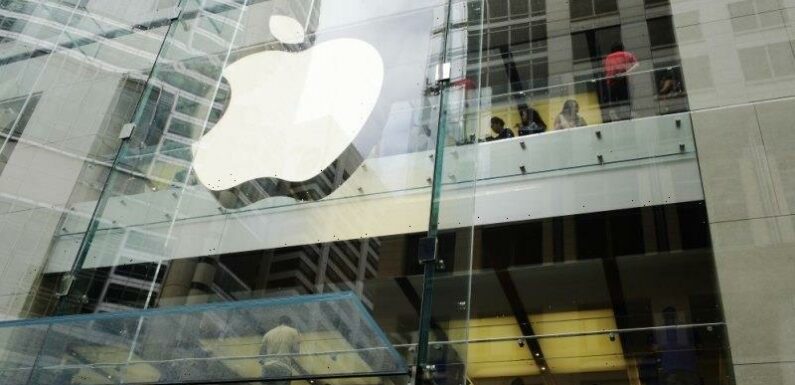
An activist retail union has filed a claim to rip up Apple’s Australian pay deal, claiming it leaves the world’s largest technology company’s 3200 store workers worse off on a host of measures.
A Retail and Fast Food Workers Union analysis submitted to the workplace umpire as part of its bid to scrap Apple stores’ 2014 enterprise agreement argues most staff would enjoy more workplace rights – including better weekend pay and rostering – on default industry pay rules.
In an escalation of a long-running pay dispute, the union’s campaign dovetails with growing union pressure on the $US2.4 trillion ($3.5 trillion) company in the US, where two stores voted to join labour unions last year in a challenge to Apple’s image as a coveted employer.
Apple has been negotiating a pay deal with store staff since its current agreement expired in 2018.Credit:Bloomberg
Workers negotiate pay agreements with employers to achieve a range of terms that are superior to the basic legal conditions under which staff in their industry are paid, and those agreements cannot be ratified unless those workers are better off under the new terms compared with the award.
But RAFFWU secretary Josh Cullinan, whose union is smaller but more activist than its rivals, said the Apple agreement should never have been approved.
“Under the current agreement, workers have to be available 24/7 to work any shift they get rostered onto, they’ve got no rights to consecutive days off, no rights to a weekend, no rights to a 12-hour break between shifts, no rights to Sundays off, no rights to core minimum conditions in the award,” he said.
‘We plan to resume negotiations for a new enterprise agreement this month and, as always, remain committed to fair and good faith bargaining.’
Apple and its employees have been locked in negotiations over a new pay deal after its current agreement expired in 2018, with unions slamming the company over its approach to bargaining, and staff voting down an offer in October last year. The expired deal keeps operating until the industrial tribunal terminates it or a new one is negotiated.
An Apple spokesman said the company prided itself on offering staff strong pay and benefits but would not specifically address questions on the union’s pay and conditions analysis. “We plan to resume negotiations for a new enterprise agreement this month and, as always, remain committed to fair and good faith bargaining,” said the spokesman.
In a separate email to staff obtained by this masthead, Apple management said it disagreed with the union’s application.
“Apple pays its team members significantly higher minimum hourly rates of pay than the base rates of pay under the retail award, and provides many benefits and programs that are not available under the award,” the email reads.
A key limitation of the union’s analysis is that it looks at only the minimum required standards and Apple pays many employees more than the minimum via a pay review process.
Gerard Dwyer, national secretary of rival union SDA, which is also involved in negotiations along with the Australian Services Union, said the termination application was “putting the cart before the horse”.
“The SDA and the ASU drove the ‘no’ vote among Apple employees. It succeeded and that was what forced Apple back to the bargaining table. The first task is to secure a new agreement, a quality outcome for all employees. If that fails, that is the time to look at termination,” Dwyer said.
Bargaining took a dramatic turn when worker Justin Gussett lodged an application with the Fair Work Commission in late December to terminate the enterprise agreement, which, if successful, would mean workers fall back to conditions on the award while a new deal is being hatched.
The federal government passed laws in December to make it more difficult for employers to unilaterally attempt to terminate agreements after major companies such as Qantas and tugboat operator Svitzer applied to Fair Work to scrap theirs during stalled workplace negotiations.
The Business Briefing newsletter delivers major stories, exclusive coverage and expert opinion. Sign up to get it every weekday morning.
Most Viewed in Technology
From our partners
Source: Read Full Article
